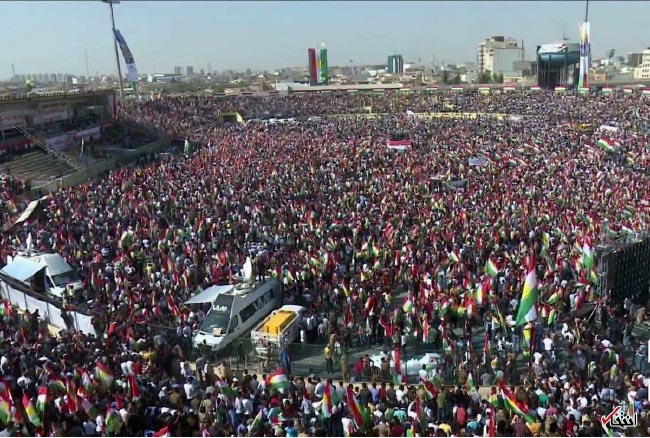The referendum on independence of Iraqi Kurdistan conducted on September 25, 2017 is naturally a political incident with the aim of establishing a new state in the Middle East. Despite being disapproved by Iraq central government and its adjacent region like European Union, United Nation and the US, the referendum was conducted with keen interest in Iraqi Kurdistan.
Following the fall of Saddam Hussein’s regime, Kurdistan region was officially recognized by Turkey and Iran; however, the term of ‘Kurdistan’ was used about a century ago in Turkey, Iran, Iraq, and Syria. People with the same ethnicity, language, culture, and custom and common interests suffered from being ethnic minority about a century and often dubbed “the largest ethnic group without a state.” Kurds form the second largest ethnic group in Turkey – the issue of Kurds was a key subject from 1970 up to now in Turkey’s policy – also the second ethnic group in Iraq after Arab Shiites, the third in Iran; where separatists were in conflicts with central government; and the fourth in Syria.
Borderlines failed to remain an obstacle before the unity of Kurds, who showed sensitivity regarding their destiny. For instance, when Abdullah Ocalan, a Kurdish nationalist leader and one of the founding members of the militant Kurdistan Workers’ Party (PKK), was arrested and sentenced to death by Turkish government in 1999, all Kurdish regions reacted strongly. Iraqi Kurdistan region constantly sheltered Kurdish Parties of Iran and Turkey. Moreover, all Kurds expressed concerns when Kobani was surrounded by the self-style Islamic State (IS) group. Hence, there is a strong sense of solidarity among Kurds who cherish forming a great Kurdistan.
It is believed that Sykes–Picot Agreement in 1916 – signed between the foreign ministers of the United Kingdom and France – sowed the seed of independence for Kurds after establishing modern nation-state over the debris of Ottoman Empire regardless of ethnic, linguistic or cultural tendencies. With the emergence of ethnic national governments of Turks, Arabs and Fars in the region, the Kurdish independent identity was ignored.
Mullah Mustafa Barzani the father of Massoud Barzani was the pioneer of urging for independence and two national parties Patriotic Union of Kurdistan led by Jalal Talibani and Kurdistan Democratic Party (KDP) led by Masoud Barzani were the most active parties within several past decades. Iraqi Kurds passed three significant historical periods: First, when Saddam’s regime was suppressed by US-led Western coalition strike after attacking Kuwait as Kurdistan region gained a relatively internal autonomy. Second, the collapse of Saddam’s regime paved the ground for Kurds’ economic and military self-sufficiency within the frame of Iraqi federal government. Third, the emergence of self-styled Islamic State group, that weakened the central government of Iraq, emboldened Peshmerga (the military forces of the autonomous region of Iraqi Kurdistan) to fight for their independence, especially after gaining the control of Kirkuk oil and agreement signed between the US and Kurdish government to give military and financial support to Peshmerga forces. The absence of a high-profile figure Jalal Talibani left the room for uncontroversial leadership of Massoud Barzani.
The success of Iraqi Kurdistan in 1990s inspired the activities of Abdullah Ocalan, also known as Apo, which was began in 1970s for gaining independence. Kurdistan Workers’ Party (PKK) resorted to armed conflict in Turkey under the leadership of Abdullah, who was finally arrested in 1999. Subsequently, PKK was divided into splinter groups but People’s Democratic Party could gained high status in Turkey’s parliament in the election.
The idea of forming Kurdistan and the Komala Party in Iran dates back to the Pahlavi regime. These efforts have been intensified at critical junctures such as the occupation of Iran during the Second World War, the Islamic Revolution of Iran, and the Iran-Iraq War. Currently, six Kurdish Iranian parties, including Komala, live in the Kurdish region of Iraq, and sometimes resort to armed conflict with the Iranian Revolutionary Guard Corps (IRGC).
The recent referendum on independence will increase short-term tension in Iraq and the region. Although Iraqi government will not be able to show military action for preventing from Kurdistan’s independence, the tension in many cases such as the issue of Kirkuk will resurface. If no peaceful solution is considered, there seems a strong possibility for armed conflicts between Hashd al-Shaabi forces, also known as the Popular Mobilization Units (PMUs), and Peshmerga. On the other hand, Kurdistan state will suffer heavy financial sanction as Turkey and Iran have embarked on tightening the security of their aerial borders. After all, the war against IS has not been ended and the issue of Kurdistan will decentralize the struggles made by Iraq and its western allies for combating IS group. Perhaps, it will smooth the path for resurface of IS and other militant fighters.
Considering the issue of Iraq, the countries with Kurdish population will show greater flexibility for the political rights, economic welfare, and ethnic identity of Kurds to strengthen mutual interaction. But since Kurdish political parties in Iran and Turkey do not cherish a single view, radical elements will seek to put pressure on states through armed conflicts, which will compound tension. After all, it will inspire other ethnic groups, who are dissatisfied with central governments, in other parts of the world to seek independence. The overt and covert role of great powers in engineering regional evolution, especially in the Middle East, is also undeniable.
Home » Opinion » The Context and Consequences of Referendum on Independence of Iraqi Kurdistan
The Context and Consequences of Referendum on Independence of Iraqi Kurdistan
| Mohammad Qasim Erfani

